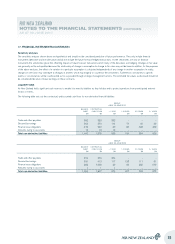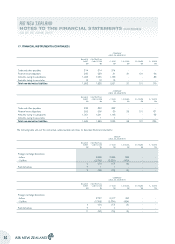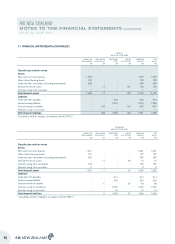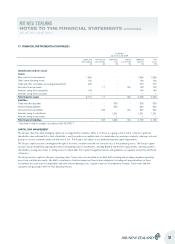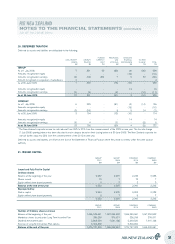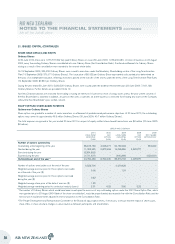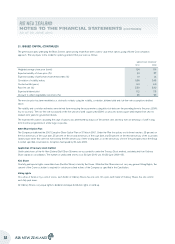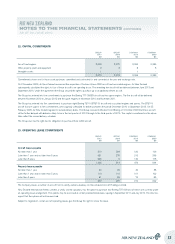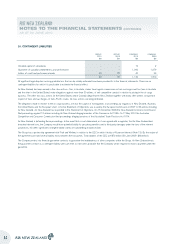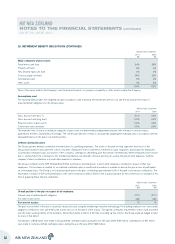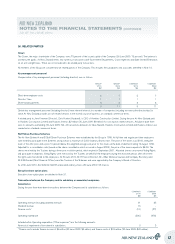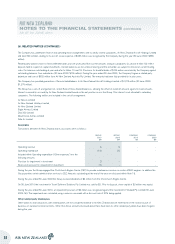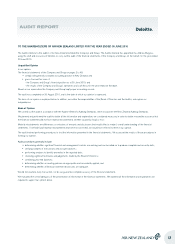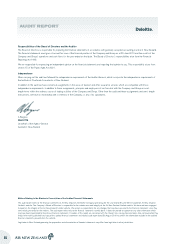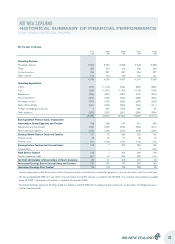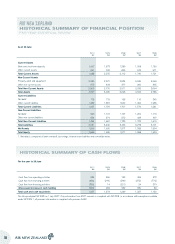Air New Zealand 2010 Annual Report Download - page 44
Download and view the complete annual report
Please find page 44 of the 2010 Air New Zealand annual report below. You can navigate through the pages in the report by either clicking on the pages listed below, or by using the keyword search tool below to find specific information within the annual report.
21. ISSUED CAPITAL (CONTINUED)
The general principles underlying the Black Scholes option pricing model have been used to value these options using a Monte Carlo simulation
approach. The key inputs to this model for options granted in that year were as follows:
GROUP AND COMPANY
2010 2009
Weighted average share price (cents) 124 114
Expected volatility of share price (%) 40 37
Expected volatility of performance benchmark index (%) 17 15
Correlation of volatility indices 0.50 0.45
Contractual life (years) 5.0 6.0
Risk free rate (%) 5.50 5.90
Expected dividend yield 5.2 7.5
Discount to reflect negotiability restrictions (%) 25 25
The exercise price has been modelled as a stochastic variable, using the volatility, correlation, dividend yield and risk-free rate assumptions detailed
above.
The volatility and correlation estimates were derived from measuring these parameters using historical data over the preceding three to five years (2009:
four to six years). The risk-free rate was based on the five year zero bond coupon yield (2009: six year zero bond coupon yield) implied from short to
medium term yields for government bonds.
The expected life used in calculating the value of options was determined by analysis of the attrition rates and early exercise behaviour of staff in long
term incentive programmes in similar large corporates.
2001 Share Option Plan
The Company established the 2001 Executive Share Option Plan on 31 March 2001. Under the Plan the options vest in three tranches: 25 percent on
the first anniversary of the issue date, 25 percent on the second anniversary of the issue date, and 50 percent on the third anniversary of the issue date.
Options lapse when they were not exercised by the fifth anniversary of their vesting date, or on the anniversary of exit if the participants leave the Group
in certain specified circumstances. All options had lapsed by 30 June 2009.
Application of treasury stock method
Unallocated shares of the Air New Zealand Staff Share Schemes are accounted for under the Treasury Stock method, and deducted from Ordinary
Share capital on consolidation. The number of unallocated shares as at 30 June 2010 was 93 (30 June 2009: 93).
Kiwi Share
One fully paid special rights convertible share (the Kiwi Share) is held by the Crown. While the Kiwi Share does not carry any general Voting Rights, the
consent of the Crown as holder is required for certain prescribed actions of the Company as specified in the Constitution.
Voting rights
On a show of hands or by a vote of voices, each holder of Ordinary Shares has one vote. On a poll, each holder of Ordinary Shares has one vote for
each fully paid share.
All Ordinary Shares carry equal rights to dividend and equal distribution rights on wind up.
AIR NEW ZEALAND
NOTES TO THE FINANCIAL STATEMENTS (CONTINUED)
AS AT 30 JUNE 2010
42



